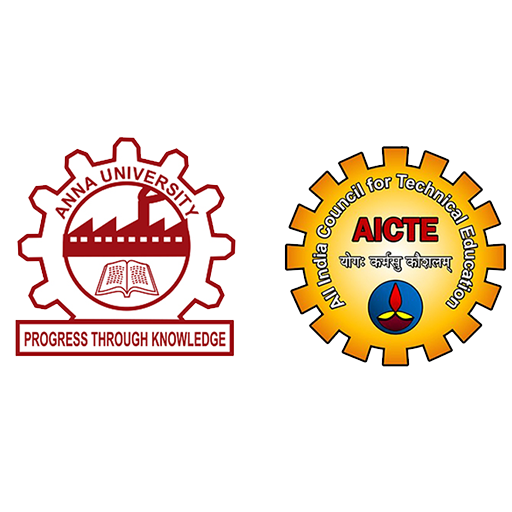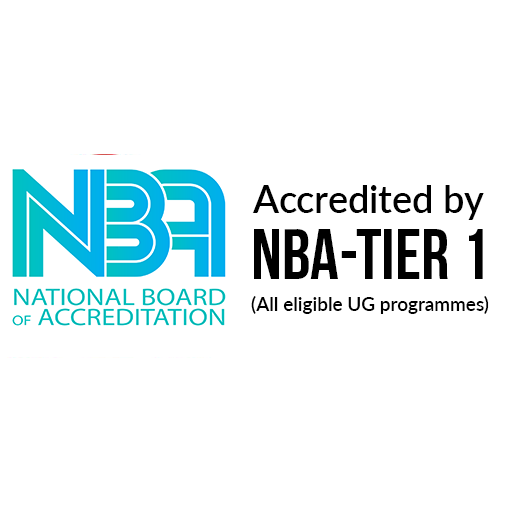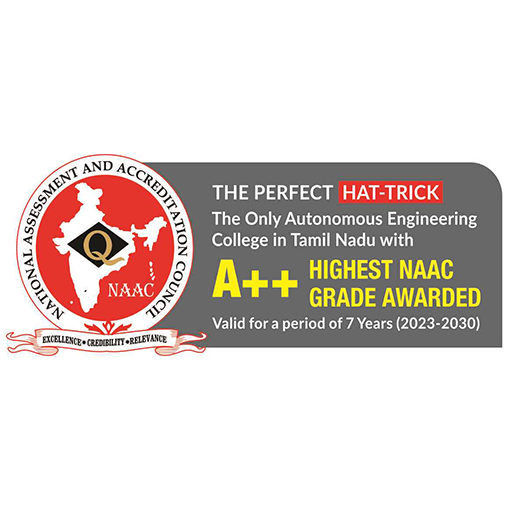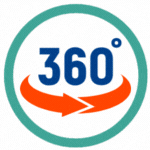MCET IDEA HACKATHON 2K25
“SMART CAFETERIA AROUND STEAM ENGINE NEARBY NPT GATE”
This competition invites engineering students from all branches to collaborate and develop a comprehensive plan for a Smart Cafeteria to be situated around the Steam Engine near the NPT Main Gate. The goal is to design a sustainable, innovative, and technically advanced cafeteria that integrates cutting-edge technology, efficient resource management, and aesthetic considerations, while also complementing the historical significance of the steam engine.
Objectives:
- To design a Smart Cafeteria incorporating technology such as automation, IoT (Internet of Things), energy efficiency, and smart ordering systems.
- To ensure the aesthetic and historical value of the Steam Engine is preserved while modernizing the surrounding area with a functional and futuristic cafeteria.
- To optimize resource management, including energy, water, waste, and food supply, through sustainable methods.
- To create an engaging space that fosters creativity, collaboration, and social interaction for students and visitors alike.
Important Dates
Proposal Submission Deadline: 31.01.2025 (Friday)
Proposal Submit to: srinivasancivil@drmcet.ac.in
jd.mech@drmcet.ac.in
Final Presentation: Intimated through mail.
Guidelines and Conditions:
- Eligibility:
- Open to students from I Year to IV year of all branches.
- Maximum 5 students for a single team. Individual participation is also encouraged.
- Team may include students from different engineering disciplines to ensure cross-functional collaboration.
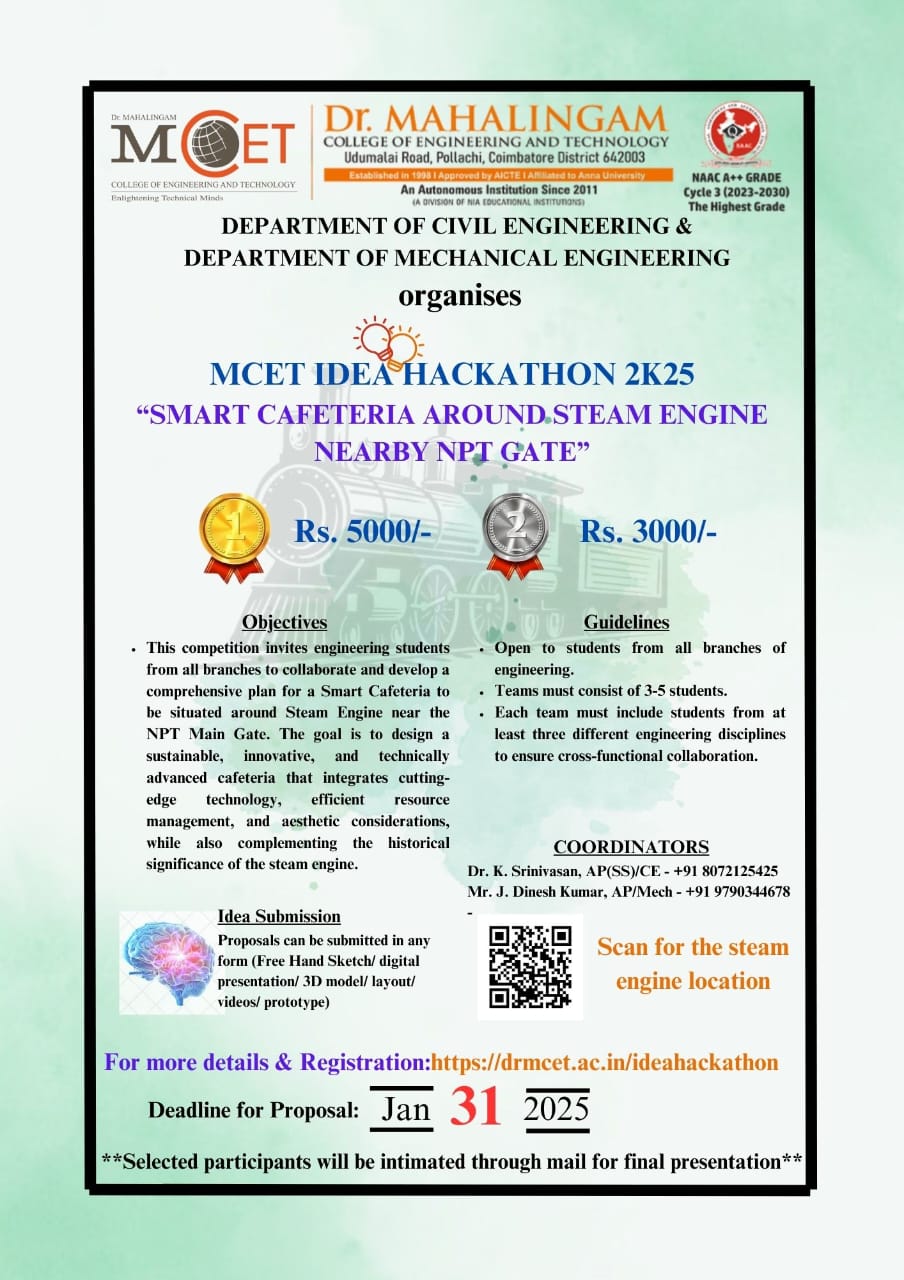
- Design and Innovation:
- Technology Integration: The cafeteria should incorporate Smart Technologies, such as:
- IoT-based smart ordering systems (for self-ordering, billing, and inventory management).
- Energy-efficient systems (LED lighting, smart HVAC, solar panels, etc.).
- Waste management (recycling and composting systems).
- Digital menu boards and automated cooking processes (robotic cooking, AI-assisted food preparation).
- Aesthetic Value: The design should reflect the historical essence of the steam engine while maintaining a modern, futuristic look.
- Space Utilization: Efficient use of space around the Steam Engine and integration of outdoor seating areas, greenery, and open spaces for relaxation.
- Sustainability:
- Energy Efficiency: Use sustainable materials and energy-saving technologies.
- Incorporate solar panels, energy-efficient lighting, and green roofing.
- Use natural cooling and heating solutions.
- Water Management: Implement water-saving mechanisms such as low-flow fixtures and water recycling systems.
- Waste Reduction: Design the cafeteria with an effective waste management system, ensuring the reuse or recycling of organic and non-organic waste.
- Functionality:
- Seamless Operations: The design may include:
- A functional kitchen layout for easy workflow and food preparation.
- Smart queues for ordering, payment, and pick-up.
- A comfortable seating arrangement with options for both individual study and group interaction.
- Accessibility: Ensure that the cafeteria is accessible to people with disabilities, with features such as wheelchair ramps, accessible counters, and restroom facilities.
- Safety Standards:
- Adhere to all safety regulations for both structural and electrical designs.
- Provide proper ventilation systems, fire exits, and emergency lighting.
- Ensure hygiene and sanitation standards are met with easily cleanable surfaces and proper waste disposal.
- Submission:
- Proposals can be submitted in any form (Free Hand Sketch/ digital presentation/ 3D model/ layout/ videos/ prototype
- Evaluation Criteria:
- Innovation and Creativity: Uniqueness of the design and use of technology.
- Sustainability: Consideration of energy, water, and waste management systems.
- Functionality: Ease of operations, user experience, and practicality of the design.
- Aesthetic Appeal: How well the design integrates with the surrounding environment, particularly the Steam Engine, and reflects modernity.
- Presentation: Clarity, structure, and thoroughness of the design presentation.
- Awards and Recognition:
- First & Second will be awarded with certificates.
- Winning designs may also have the potential to be implemented as the actual Smart Cafeteria (subject to feasibility and approval).
- Collaboration with Industry Partners:
- Teams are encouraged to collaborate with industry partners for insights, resources, and technical advice.
- Mentorship opportunities may be available from faculty members and industry professionals.
- Ethical Considerations:
- Ensure all designs are original and free from plagiarism.
- Teams must adhere to ethical principles in the use of technology, sustainability, and inclusivity.

